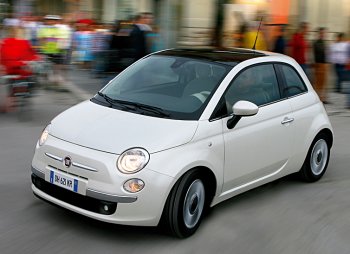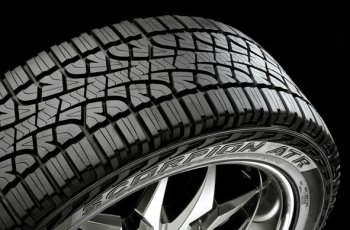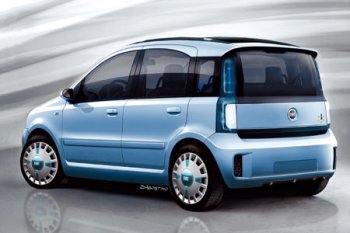

 |
Fiat will be represented on the Vizzola test track by seven Fiat 500s
(top) powered by the sparkling 100 bhp 1.4 16v engine and equipped
with new “green” Pirelli Cinturato tyres. And two
particularly environment-friendly models will be on display
in Piazza del Duomo; the Panda MultiEco prototype (above) and the
Panda Panda Climbing. |
|
|
|
The history of Pirelli
Cinturato tyres is an integral part of the history of
Italian motoring and of Fiat Group brands: from Fangio’s
Ferraris to Lancia flagships, a huge number of models have
left Fiat plants fitted out with Pirelli tyres. Recent Fiat
Group Automobiles car models that mount Pirelli tyres as
first equipment include the Fiat Bravo, the Fiat 500 (in the
larger size) and the Alfa 159, while the light commercial
vehicles include the new Ducato. We should also point out
that it is Fiat Group Automobiles policy to extend use of
the new “green” tyres, to help reduce fuel consumption and
emissions.
This is why Fiat Group
Automobiles is taking part in the event organised by Pirelli
from January 17 to 23 in Milan. The company will be
represented on the Vizzola test track by seven Fiat 500s
powered by the sparkling 100 bhp 1.4 16v engine and equipped
with new “green” Pirelli Cinturato tyres. And two
particularly environment-friendly models will be on display
in Piazza del Duomo; the Panda MultiEco prototype and the
Panda Panda Climbing.
Panda
Panda Climbing
Together with the Panda Panda
and Panda Panda Van versions, the Panda Panda Climbing
completes the range of a model with a low environmental
impact that has become a benchmark for sustainable urban
mobility. The best proof of this are the approximately
30,000 new Panda Pandas registered in 2007, a figure that
has certainly contributed to the total of over 50,000
registrations for the entire Fiat Natural Power range in the
same period. In addition to which the Panda Panda is the
ideal solution for small company fleets, because it can
circulate without restrictions, as can all methane-powered
vehicles.
On sale from last October
(2,800 orders have been received in Italy so far), the Panda
Panda Climbing (with 4x2 drive) is powered by the 1.2
petrol/methane dual-fuel engine, and inherits all the
stylistic features of the Panda 4x4 Climbing: from the
special bumpers to the large rubbing strips that match the
mouldings on the wings. The car also comes with a vast array
of equipment: from ABS with EBD (Electronic Brake
Distribution) to Dualdrive™ electric power steering, a
Blaupunkt radio with CD player and MP3 reader, and a climate
system with pollen filter. Customers can choose from nine
body colours, three interiors with special fabric
upholstery, and numerous options and articles from the
Lineaccessori range.
The Panda Panda Climbing has
plenty of content and a personality of its own, plus all the
innovative features of the Panda Panda. Two separate methane
tanks have been incorporated in the floorpan, which is
derived from the 4x4 version, with a total capacity of 72
litres (12 kg), thus maintaining the roominess of the
original car, where both passenger space and luggage space
are concerned (with a single or split rear seat, luggage
compartment capacity increases from 190 to 840 dm3,
measured up to the ceiling). And the capacity of 72 litres
guarantees a range of 270 km in the combined cycle, running
on methane alone. The capacity of the petrol tank is 30
litres, the same as on the petrol version, so a “tank-full
of peace of mind” is guaranteed, even in areas where there
are few methane service stations (over 700 km in the
combined cycle, running on methane and petrol).
With the Panda
Panda Climbing, Fiat Automobiles confirms its leadership in
the methane field and its unremitting effort to find
solutions that reconcile the customer’s needs (the same
amount of roominess, a generous range, maximum safety and
the captivating styling of a City SUV), and maximum respect
for the environment. Methane driven vehicles reduce CO2
emissions by about 23% compared to equivalent petrol-driven
models, and particulate emissions (PM) are practically nil.
Panda
MultiEco
The Panda MultiEco
synergetically associates existing technologies with others
ready for industrialisation. It combines an innovative
powertrain architecture – comprising a petrol/methane
dual-fuel engine, an MTA gearbox and a BAS device – with the
use of eco-compatible (recycled, recyclable or natural)
materials inside and outside the vehicle. And the result is
made all the more interesting by painstakingly optimised
aerodynamics, and a significant weight reduction. The Panda MultiEco is powered
by a FIRE engine (running on methane and petrol) combined
with a BAS device (Belt-driven Alternator-Starter) and a
robotised Dualogic gearbox.
The first of these devices,
which is both an electrical generator and a starter motor,
makes for easier starts and more efficient power generation,
while the innovative MTA gearbox (Manual Transmission
Automated) ensures optimal management of gear changes and
outstanding mechanical efficiency.
The automated transmission
lays the foundation for “intelligent” management of the
on/off status of the engine. The system controls the clutch,
and allows the internal combustion engine to be cut off from
the transmission whenever no traction is required and the
engine can be turned off. It is restarted instantly and
silently by a reversible electric device (the BAS,
Belt-driven Alternator-Starter) which replaces the
alternator in the belt drive and performs the dual role of
starter motor and electric generator.
In addition to the exclusive
built-in propulsion system, the Panda MultiEco also reveals
interesting progress in the field of improved aerodynamics (Cd
of 0.295) and weight distribution. Suffice it to say that
the show car weighs 92 kg less than the methane version,
thanks to the use of a number of components (engine bonnet
and tailgate) made of thermoplastics, the adoption of a set
of “light” seats that are pre-assembled in pairs on a
carrier, and methane storage cylinders made of high
performance steel and carbon fibre.
The combined effect of the various solutions developed
by the Fiat Group (Fiat Group Automobiles, Fiat
Powertrain Technologies and Centro Ricerche Fiat), and
the use of proprietary control strategies have resulted
in drastically reduced emissions on the show car. In
particular, CO2 emissions are 42% lower than those on the petrol version
in the urban cycle and 32% lower in the NEDC cycle. In terms
of emissions, this result is added to the benefits of
methane, which is the only realistically feasible option
today, to significantly improve the quality of exhaust
emissions, particularly with regard to substances that are
responsible for photochemical smog and with a strong impact
on human health. Additional advantages for customers are
lower consumption and the lower cost of methane, which
significantly reduces the cost per kilometre.
|